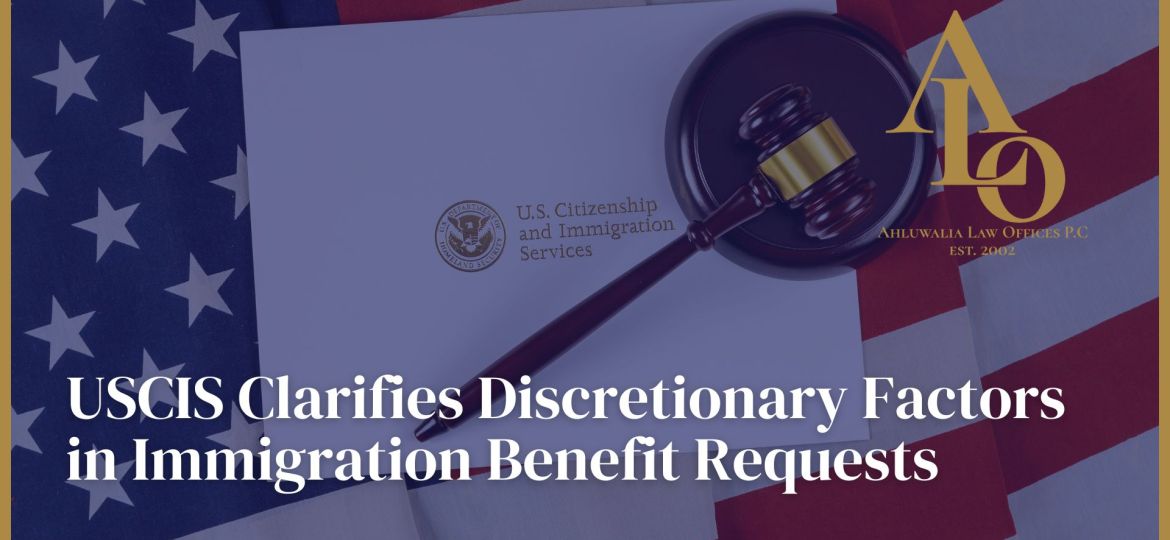
On August 19, 2025, U.S. Citizenship and Immigration Services (USCIS) issued Policy Alert PA-2025-16, clarifying how officers should apply discretionary analysis in certain immigration benefit requests. This update, effective immediately, applies to pending and newly filed cases and provides important guidance for foreign nationals, visa holders, and investors seeking U.S. immigration benefits.
What is Discretionary Analysis?
When adjudicating certain immigration benefits—such as adjustment of status, extensions or changes of nonimmigrant status, reinstatement of F or M student status, and some employment authorization requests—USCIS conducts a two-step review:
- Eligibility Determination: Officers first confirm whether the applicant meets all threshold eligibility requirements under law.
- Discretionary Review: Even if eligibility is established, officers then weigh positive and negative factors to determine if granting the benefit is appropriate.
Under the Immigration and Nationality Act (INA §291), the applicant bears the burden of proof to demonstrate that a favorable exercise of discretion is warranted.
Key Updates in the Policy Manual
The updated guidance highlights several critical points:
- National Security and Anti-American Activities: USCIS assigns significant negative discretionary weight to cases where an applicant has endorsed, supported, or promoted terrorist organizations, anti-American ideologies, or antisemitic terrorism. Such involvement can lead to denial, even when eligibility requirements are met.
- Lawful Applications for Admission or Parole: USCIS officers now explicitly consider whether prior requests for admission or parole complied with all applicable laws and regulations at the time they were filed.
- Employment-Based Petitions:
- National Interest Waivers (NIWs): Discretionary analysis applies only to cases involving NIWs under INA §203(b)(2)(B).
- EB-5 Investor Petitions: Discretion will be applied in cases involving fraud, misrepresentation, deceit, criminal misuse, or threats to the national interest. This also extends to applications filed by Regional Centers and commercial enterprises.
- Adjustment of Status: Officers are required to analyze whether granting adjustment is warranted in the totality of the circumstances, weighing family ties, immigration history, humanitarian considerations, and compliance with U.S. law.
- Extensions, Changes, and Reinstatement of Status: The guidance affirms that USCIS exercises discretion in decisions relating to extensions of stay, changes of status, reinstatements of F/M status, and certain employment authorization requests under 8 CFR 274a.12(c).
What This Means for Applicants
This policy update underscores that eligibility alone does not guarantee approval. Applicants must also demonstrate that their record, character, and compliance with immigration law support a favorable discretionary decision. For business and investor visas, especially EB-5 petitions, transparency and compliance in all filings are more important than ever.
Foreign nationals and investors should work closely with legal counsel to:
- Ensure past immigration filings were consistent with U.S. law.
- Prepare evidence demonstrating positive equities (such as family ties, U.S. employment, or community contributions).
- Avoid omissions or misrepresentations that could be weighed heavily against the case.
Conclusion
The USCIS discretionary factors update of August 2025 signals a heightened emphasis on national security, lawful compliance, and integrity of applications. Whether you are seeking adjustment of status, a student status reinstatement, or pursuing an investor petition, understanding how discretion is applied is essential to a successful immigration strategy.

